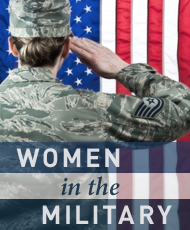
For as long as she can remember, my Aunt Robyn always knew she wanted to join the Army. She would follow anyone who happened to be wearing a uniform. In 1981, Robyn finally got to put on her own uniform when she enlisted at the age of 18, straight out of high school, and became a Private E-1.
Although the Army had integrated basic training for men and women some years prior to Robyn joining up, she always felt that commanders were scrutinizing the women to see what they could handle when compared to their male counterparts. To prove themselves, she and her fellow females had to work harder.
After basic, Robyn served as a field radio operator, a military occupation specialty that had just opened to women for the first time. However, direct ground combat positions were off limits to women. When asked if she would have served in direct combat, if given the chance, Robyn replied, โYes, I wanted to test my mettle. I always wondered how I would perform.โ
Yet, current Department of Defense (DoD) policy still precludes women from being โassignedโ to most combat units. This policy is wrong and should be changed as soon as possible.
In fact, the congressionally established The report recommends the removal of โinstitutional barriers in order to open traditionally closed doors, especially those relating to assignments โ both the initial career field assignment and subsequent assignments to key positions.โ It explains that about 10 percent of Marine Corps and Army occupational specialties are closed to women, and that the exclusion serves as a barrier to womenโs advancement. The off-limits occupations (including infantry, armor, artillery, cavalry, and special forces) are held by nearly a third of all Army personnel โ all men. And approximately 80 percent of officers are promoted from combat arms occupations.
Moreover, as the Service Womenโs Action Network notes, there is a The policy does not reflect the realities of modern warfare, where battle lines are undefined and servicewomen find themselves in the thick of the fight, challenging gender stereotypes. , โWomen serving in combat environments are being shot at, killed and maimed.โ At most recent count, have made the ultimate sacrifice while serving their country in Iraq and Afghanistan.
Unlike men, women are prejudged to be unqualified for the physical demands of ground combat based on overly broad generalizations and outmoded stereotypes. My aunt tells a funny story about a combat simulation during basic, where she and two other females were the only recruits left standing by the end, the men couldnโt cut it. So much for stereotypes.
Yet evidence from womenโs actual experience in combat shows that their presence can actually enhance military effectiveness, and that .
The ภฯฐฤรลฟชฝฑฝแน๛ cares deeply about ending discrimination in the military and is heartened that military advisory commissions have that acts as a barrier to the advancement of women in the armed services. Now we await the departmentโs response and hope that it finally gives credit where credit is due: to the military women who bravely serve our country.
Learn more about discrimination in the military: Sign up for breaking news alerts, , and .

